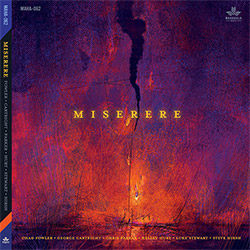
Miserere is the recent brainchild of Chad Fowler, and it is a deeply inspired one. One can glean this from the title, which means the imperative "forgive." The inside flap contains blotches of color and the words, "Domine deus noster miserere nobis," ("Lord, our God, forgive us)" likely pointing to origins in the Catholic liturgy. In line with that theme, the final track is a take on the 11th century composition "Ut Queant Laxis " ("Do let our voices") by Guido of Arezzo.
The project found inspiration deep in the tradition of western music and, one could add, in the metaphorical confines of the cloister, in traditions maintained over centuries, in a language (musical and spoken) nearly extinct, understood by few, imbued with lost meaning and claims of metaphysical truth and therefore somewhere between cryptic and magical. Stylistically, the group draws on the exuberant spiritual jazz of the 1970s, whose complex entanglement of sounds and unwritten rules can make it similarly enigmatic and, at its best, emotively transcendent.
The first piece, the titular "Miserere", begins with a sweeping force. The full band contributes to the theme. Members then peel off and nervously squeak and squonk around it, while Chris Parker's piano and beautiful baritone voice provide the gravitational thematic/melodic pull against which the others fight. Indeed, any forgiveness worth begging for (or granting) requires tension between conformity and rebellion, a set path and deviation, a center and the forces that break it apart.
"Wonderful Words of Life" and "Inhaling & Exhaling" are almost companion pieces. The first starts as a somber hymn but devolves and reforms as an ebullient concoction of wailing horns and the churning vroom of rhythm. "Inhaling & Exhaling — for Davey Williams", meanwhile, is an homage to recently deceased American guitarist Davey Williams. After a quick recitation of Williams' own writings, the band bursts out in an energetic jaunt through controlled, panting and growling breath, soon joined by the fierce rhythm section of Luke Stewart, Steve Hirsh and Parker, who churn the piece into a veritable vortex of sound. Cartwright also picks up his guitar a few minutes later, spewing characteristically fractured lines. As much as "Wonderful Words" leans toward Ayler, "Inhaling & Exhaling" appropriately pulls on Curlew, Cartwright and Williams' erstwhile group, though only for sections.
"Ut Queant Laxis" is the oddball and a true standout. Conceived a millennium ago, the composition follows a different musical system, an older, now obscure language. Still, the drive to bring sound to the fore, to let voices resound, to meditate on the interior and spiritual, make this piece as much an essential component to this album (and it needs to be heard as a coherent and select series of pieces) as a bridge between traditions. This realization is absolutely stunning. It slowly unfolds from a breathy bass-flute playing Arezzo's original theme accompanied by soft ambient crackles and jangles into a full free-improv soundscape to which Hurt adds muted and mournful moans, which evoke the medieval choral tradition as much as they do blues. In the last few minutes, the leitmotif returns, now exorcized from its demons and anxieties, now somber and serene, and it drifts on, seemingly even after the ritual ends. The voices have sung. The bells have rung. And, given the passion and beauty of Miserere, forgiveness had to have been granted.
Comments and Feedback:



More Recent Reviews, Articles, and Interviews @ The Squid's Ear...


|

